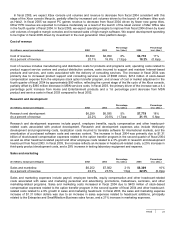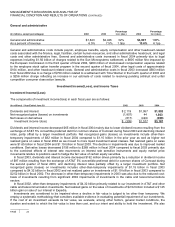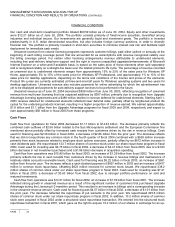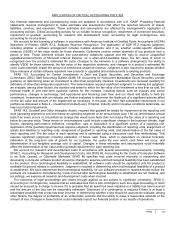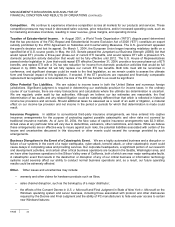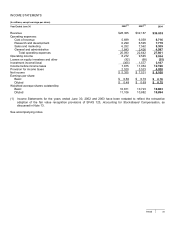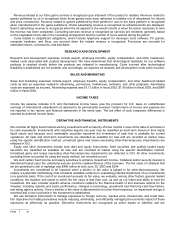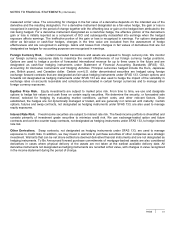Microsoft 2004 Annual Report Download - page 32
Download and view the complete annual report
Please find page 32 of the 2004 Microsoft annual report below. You can navigate through the pages in the report by either clicking on the pages listed below, or by using the keyword search tool below to find specific information within the annual report.
MANAGEMENT’S DISCUSSION AND ANALYSIS OF
FINANCIAL CONDITION AND RESULTS OF OPERATIONS (CONTINUED)
PAGE 32
Competition. We continue to experience intensive competition across all markets for our products and services. These
competitive pressures may result in decreased sales volumes, price reductions, and/or increased operating costs, such as
for marketing and sales incentives, resulting in lower revenue, gross margins, and operating income.
Taxation of Extraterritorial Income. In August 2001, a World Trade Organization (“WTO”) dispute panel determined
that the tax provisions of the FSC Repeal and Extraterritorial Income Exclusion Act of 2000 (“ETI”) constitute an export
subsidy prohibited by the WTO Agreement on Subsidies and Countervailing Measures. The U.S. government appealed
the panel’s decision and lost its appeal. On March 1, 2004, the European Union began imposing retaliatory tariffs on a
specified list of U.S.-source goods. In May, the U.S. Senate passed the Jumpstart our Business Strength (JOBS) Act that
would repeal ETI, provide a three-year phase-out of current ETI benefits, and would replace ETI with a phased-in 9%
domestic production activity deduction that would not be fully effective until 2012. The U.S. House of Representatives
passed similar legislation in June that would repeal ETI effective December 31, 2004, provide a two-year phase-out of ETI
benefits, and replace ETI with a 3% tax rate reduction for income from domestic production activities that would be full
phased in by 2006. Neither bill will fully replace our current ETI tax benefits. Both bills must still be reconciled in
conference, and significant changes could be made to the final legislation, so we remain unable to assess the ultimate
form and financial impact of this legislation, if enacted. If the ETI provisions are repealed and financially comparable
replacement tax legislation is not enacted, the loss of the ETI tax benefit to us could be significant.
Other Potential Tax Liabilities. We are subject to income taxes in both the United States and numerous foreign
jurisdictions. Significant judgment is required in determining our worldwide provision for income taxes. In the ordinary
course of our business, there are many transactions and calculations where the ultimate tax determination is uncertain.
We are regularly under audit by tax authorities. Although we believe our tax estimates are reasonable, the final
determination of tax audits and any related litigation could be materially different than that which is reflected in historical
income tax provisions and accruals. Should additional taxes be assessed as a result of an audit or litigation, a material
effect on our income tax provision and net income in the period or periods for which that determination is made could
result.
Insurance Programs. In addition to conventional third-party insurance arrangements, we have entered into captive
insurance arrangements for the purpose of protecting against possible catastrophic and other risks not covered by
traditional insurance markets. As of June 30, 2004, the face value of captive insurance arrangements was $2.0 billion.
Actual value at any particular time will vary due to deductibles, exclusions, other restrictions, and claims. While we believe
these arrangements are an effective way to insure against such risks, the potential liabilities associated with certain of the
issues and uncertainties discussed in this document or other events could exceed the coverage provided by such
arrangements.
Business Disruptions in the Event of a Catastrophic Event. We are a highly automated business and a disruption or
failure of our systems in the event of a major earthquake, cyber-attack, terrorist attack, or other catastrophic event could
cause delays in completing sales and providing services. Our corporate headquarters, a significant portion of our research
and development activities, and certain other critical business operations are located in the Seattle, Washington area, and
we have other business operations in the Silicon Valley area of California, both of which are near major earthquake faults.
A catastrophic event that results in the destruction or disruption of any of our critical business or information technology
systems could severely affect our ability to conduct normal business operations and, as a result, our future operating
results could be adversely affected.
Other. Other issues and uncertainties may include:
• warranty and other claims for hardware products such as Xbox;
• sales channel disruption, such as the bankruptcy of a major distributor;
• the effects of the Consent Decree in U.S. v. Microsoft and Final Judgment in State of New York v. Microsoft on the
Windows operating system and server business, including those associated with protocol and other disclosures
required by the Decree and Final Judgment and the ability of PC manufacturers to hide end-user access to certain
new Windows features;



